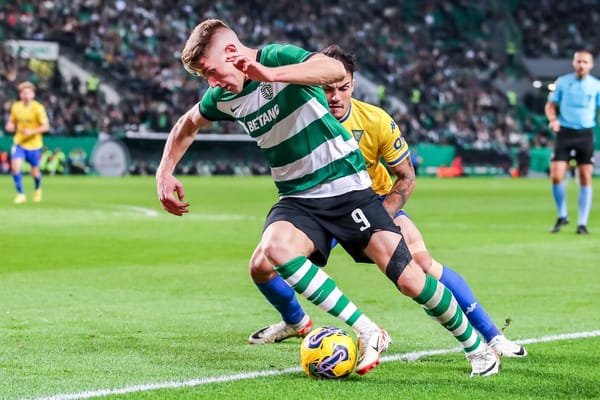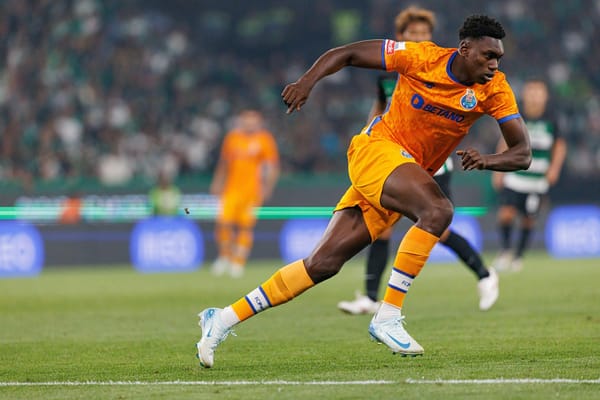Verticality, intensity and defensive awareness are destroying Xavi's progress at Barcelona
Xavi's vertical approach sacrificed control and short-passing for quicker transitions. For a young team this led to rushed decisions, and disjointed buildup.
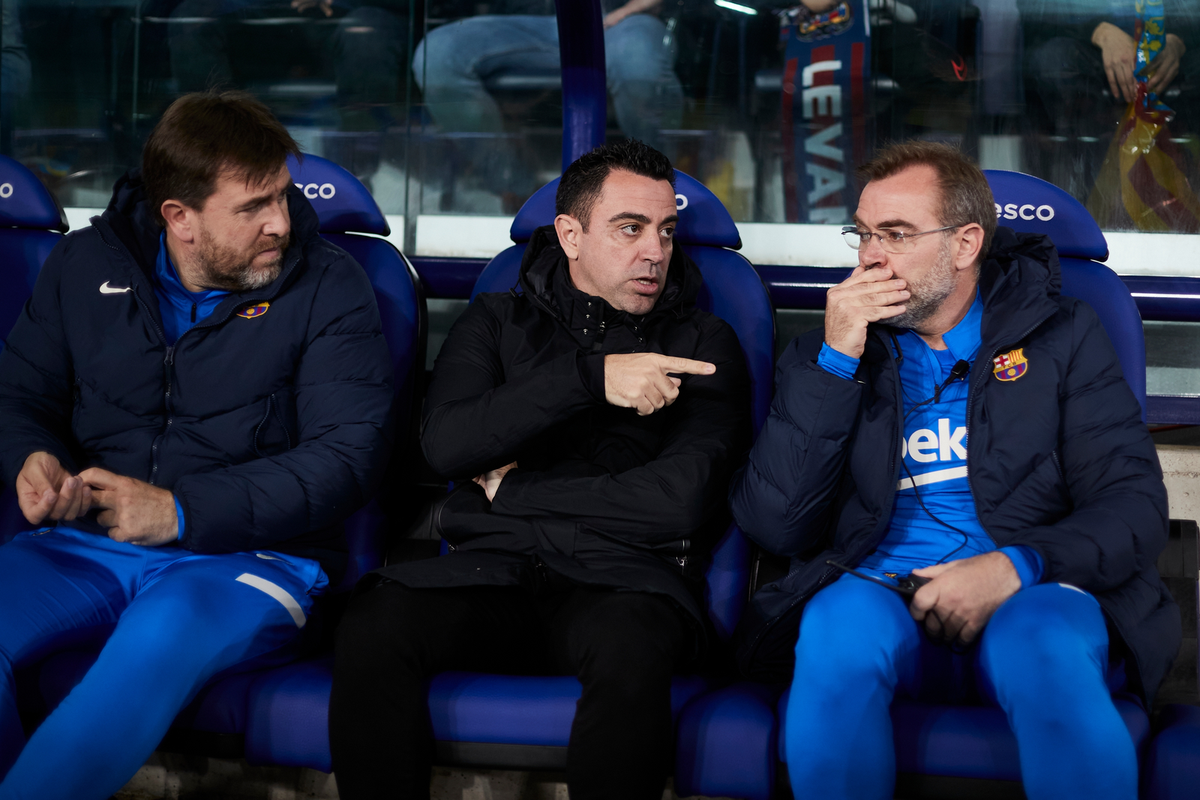
Xavi’s impact at Barcelona cannot and should not be understated. Yes, the title charge is officially a thing of the past but the Catalans’ surge for Champions League football has been a success. The victory over Real Betis on Saturday secured Europe for Barcelona and despite some recent disappointments, that fate is something many Culés would’ve happily agreed to before Xavi’s arrival.
With that being said, however, there’s a weird aftertaste in most fans’ mouths. And I wager Xavi is feeling the same thing. Barcelona could’ve - and perhaps should’ve - done more. The Europa League isn’t as prestigious as the Champions League but winning it would’ve surely laid some ghosts to rest, at least for the time being and until the team is fully ready to compete on all fronts. For now though, they can be a domestic force at best.
But I say this with a slight caveat. The caveat, as ever, is Barcelona’s capacity to defend at the top level. For all intents and purposes, the art of defending is and always has been a collective effort so blaming it on individuals won’t get us far. A new left-back who tackles the ball better than Jordi Alba is hardly the difference between Barcelona getting battered by the likes of Liverpool & Bayern Munich and their triumph on the European stage.
Looking back at their bad run of games ranging from Levante (despite the win) to Rayo Vallecano or even Mallorca and Real Betis (again, despite the wins), there are some common flaws Barcelona keep showing and it’s hurting their progress. So today, I’ll aim to shed some light on the structural and individual issues that haunt the team and elaborate on them slightly.
Note, however, that proposing solutions immediately would make the article far too long so I’ll have to split this into a two-part analysis.
Let’s roll.
(The lack of) Intensity & awareness
This may sound like common knowledge at this point but rewatching the last games Barcelona have played - and especially the chances conceded - the issue of intensity, compactness and passivity seem more prevalent than ever. Or, perhaps, not as addressed by Xavi like some other aspects of Barcelona’s game, most notably referring to the in-possession phases of play.
However, off-the-ball proficiency is as important, especially considering lacklustre defending has been the bane of the Catalans’ European existence in the last several years or so. In this section of our analysis, I’ll exclusively use video footage and focus on situations in which Barcelona lost possession of the ball and subsequently conceded goal-scoring opportunities to the opposition.
Some of the main flaws I’ve managed to identify are the lack of intensity or passive defending, insistence on always rushing forward to close down a player, chasing the ball with no sense of space, no compactness, and lacklustre tracking back and lack of smell for danger. I’ll elaborate on all of it shortly, too. Let’s start with a couple of relatively similar examples that you can essentially find in any of the games stretching from the aforementioned sample pool of matches in recent weeks.

The example above comes from the win against Levante. I want you to focus on the passive approach to defending here, especially from the midfielders and players closest to the ball. Even though the play ends with an incredible run from José Luis Morales, which shouldn’t be played down, the crux of the problem is at the beginning of the sequence.
Notice the passivity in the central areas and the absolute lack of smell for danger in Barcelona’s ranks. When playing at the top level and against top opposition, you cannot allow the other team so much time and space on the ball. Barcelona have a situation of numerical equality in the centre of the pitch but the dynamic superiority is rarely - if ever - in their favour. In simple terms, numerical superiority equates to advantage in number, ie having more players than the opposition in any given area. Dynamic superiority, on the other hand, relates to movement and the timing of it. A player with dynamic superiority usually has a headstart over his counterpart, starting the movement earlier and subsequently having an advantage because of it.
Let’s look at another similar example before I elaborate on the issue at hand a bit further. This time, we’re visiting the 1:0 loss to Cádiz. Barcelona are a heavy man-marking team when it comes to collapsing and pressing, which in itself is a big issue when you have a team full of technical elites with no no-nonsense, defender-first profiles.
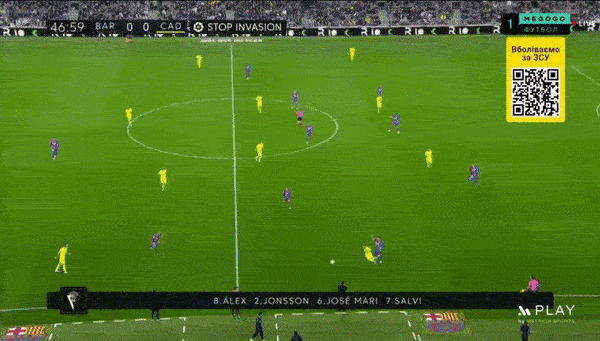
Notice how the situation is almost identical to the first one. Barcelona are largely reactive in their defending, not proactive, meaning they chase shadows because they’re always one step behind the opposition. Every player starts chasing their man the moment the pass is played as opposed to being preoccupied with the space that needs to be closed down as soon as possible.
This gives an impression of pressing like a headless chicken, just following the ball with no real plan or structure behind it. The passivity is also prevalent as Cádiz look more like Barcelona in this sequence than Barcelona themselves. And how wouldn’t they with the time and space afforded to them by the struggling defenders? Admittedly, this could’ve been prevented had Jordi Alba not botched his clearance after intercepting the lofted pass but the issue still remains regardless.
Finally, we have the lacklustre tracking back once more. If you see the opposition breaking into a dangerous area of the pitch, you don’t stroll back. The reaction time of some of the players in this Barcelona team is astoundingly bad, especially considering the squad’s aspirations for the future. But all of these issues remain even when the team is enjoying numerical superiority.

Again, we’ll visit the same game against Cádiz. Notice Barcelona have the bodies to collapse and are enjoying numerical superiority in this example. However, in spite of that, the Cádiz players manage to retain their dynamic superiority, using it to sustain the attack and create a potentially dangerous situation in front of goal. Once more, the lack of intensity and tracking back properly gives the opposition all the tools they need to finish the sequence.
Notice how Cádiz players receive in space and have the time to turn and play passes calmly. Of course, this is very late in the game so fatigue is bound to kick in but Barcelona are chasing the game so don’t have the leisure of taking it easy. Either way, that’s hardly an excuse for such passive defending.
The final example from that game will focus slightly on Frenkie de Jong, specifically because I feel this is exactly what’s keeping him from becoming a more confident and commanding number 6 for Barcelona.

The Cádiz game is so infuriating because it’s full of examples like the one above and they’re all very similar in nature. Ultimately, that often makes the difference between a controlled game in which Barcelona successfully sustain pressure and beat the opposition with wave after wave of positional attacks and a chaotic end-to-end affair in which they lose 1:0 at the Camp Nou.
Look at De Jong specifically who is very passive and doesn’t anticipate danger at all. We often talk about defensive awareness and whether or not players have that innate. Some do but often, those players are defenders first and everything else second. It’s very similar to how centre-backs will have that instinct to exit their line, successfully judging the situation, weighing up the pros and the cons in an instant before closing down the opponent between the lines. This is something that’s very difficult to train and some players are naturally better at it than others.
The same is true with players who are defenders first; moulded into their roles from a young age, perfecting the instinct that helps them in such scenarios. Of course, coaching can and does help but that’s often a tiresome and complex process. Pep Guardiola, most notably, is very good at making average defenders look far better because he not only creates the structure to help them but also makes them aware of the space they need to defend. Ultimately, this is one of the main reasons why I believe Barcelona should abandon the heavy man-marking approach and practice a more zonal one.
Take a look at the example below, once again featuring De Jong, who, sadly, destroys Barcelona’s defensive block on his own and with a single move.

This, of course, comes courtesy of the infamous Eintracht Frankfurt game; a clash in which Barcelona got outplayed both on and off the pitch. Naturally, there are several different examples that make for sad viewing but the example above stands out for De Jong specifically. This is also exactly the reason why I think swapping to a more zonal approach could be productive for Barcelona - it will teach them discipline, make them more aware of the spaces rather than just chasing the ball and force them to work better and harder as a unit.
Every Barcelona player’s first instinct is to go forward and attack the ball aggressively. But what was exactly De Jong’s task here? Just that one move exposed the whole defence. Sure, had he actually gotten the ball, we would likely be having a different discussion now but this sort of high-risk, high-reward action is defensively suicidal. Add to that the passive tracking back and suddenly you realise Eintracht should’ve been 4:0 up at that point.
Barcelona players have no sense of danger and sometimes, this makes it seem like they also have no respect for the opposition. Our final example, also coming from the same clash, will show what I mean by that.
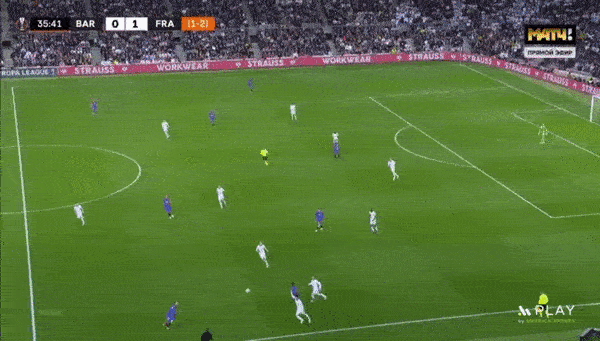
Here, Óscar Mingueza, who, admittedly, isn’t first-team material anyway, makes a very basic mistake that ultimately leads to a ridiculous effort to put the guests two-nil up. But beyond the miraculous strike is another flaw Barcelona suffer from - no smell for danger. The Catalans are in a 5vs3 situation out by the touchline, meaning they have limited angles to exploit as it is, and yet, they opt to go into a rondo heavily outnumbered and against a much more intense team. This, again, is defensive suicide.
Once the ball is inevitably lost, it takes the Germans only but a few touches to break free and have an uninterrupted effort at goal. The ridiculous strike aside, the goal is Barcelona’s own making. Call it karma for simply underestimating the opposition and choosing to play into danger rather than out of it.
And this particular example also helps us identify the next big flaw in Barcelona’s game that needs to be addressed immediately - the insistence on always going forward.
Verticality & ‘La Pausa’
I’ve been a big defender of negative passing and its many benefits. Even though it’s not always aesthetically pleasing nor does it get you out of your seat, passing the ball backwards has many benefits, many of which are directly related to ball progression and advancing up the pitch. Verticality is a must if your plan is to get to the opposition’s goal but patience plays a key role too. Barcelona under Xavi have had very little of it so far.
This new iteration of the Blaugrana is a very vertical team; a team whose mindset is to always go forward, penetrate the block and cut through the opposition’s structure. It’s both admirable and impressive but also, at times, counterproductive. Being too vertical too quickly can be a recipe for disaster. In fact, it has been for Barcelona on numerous occasions so far in the season, especially in the analysed sample of games.
It’s not so much that they are bad at recycling the ball, the numbers state their 613.27 average passes per game are only slightly behind Manchester City’s 648.02 and above Arsenal’s 464.36. Similarly, they make more passes per minute of possession than either of the other two teams, signalling they know how to retain the ball when necessary. But it’s the isolated scenarios that hurt Barcelona the most; situations in which you don’t want to be vertical but for some reason still pull the trigger, unnecessarily putting your team at risk.

Above is a very recent example from the game against Rayo Vallecano. I had the pleasure of watching that game from the stands and seeing these things live made it even clearer - Barcelona are a very high-risk, high-reward team under Xavi. But there are situations when that’s not necessary, or even advised. Of course, you have to be courageous in football and fortune often favours the bold but picking your battles right is crucial.
Take the sequences above as a good example. Barcelona are facing a mid-to-high defensive block from Rayo and are still aiming to penetrate through extremely risky passing. If they succeed, chances are they’ll be in a good position to threaten the opposition’s goal. However, if they don’t - which is exactly what happened - the script flips instantaneously. Across all of the examples in this section, I’ll highlight the position of the other team’s most advanced players or players that are in a position to directly threaten Barcelona’s goal following the recovery of possession.
As a general rule of thumb, you want those players as deep on the pitch as possible. This won’t stop the counter-attacks but will make them significantly more difficult to execute simply because the travel distance is far greater if they’re pinned down in a low block and not in a mid-to-high one. Barcelona often take the risk even when the consequences are deadly.

Here are examples from multiple other games where taking the risk was not worth it. Note that in the top right image Eintracht Frankfurt already have possession of the ball as Barcelona had lost it moments prior to that situation. This is a decision-making flaw. Weighing up the risk vs reward is something that comes with experience and being a very young team, this could be down to their (over) eagerness.
Let’s explore some video examples from recent games that can shed more light on the issue at hand. The first one will be from the Rayo Vallecano defeat once more. Below, you can see Barcelona are trying to play out of pressure after regaining the ball deep in their own half. However, despite some initial success in pushing the opposition back, they’re insistent on playing forward and into pressure.

The moment Gavi goes for De Jong even though they’re outnumbered 5v2, Barcelona’s chances of success dropped significantly. Yes, the one-two combination between the two midfielders is possible but far too risky considering the opposition have numbers in Barcelona’s half. In scenarios like that one, it’s better to slow down the tempo, reset and pin the other team back before advancing. Instead, Rayo get a fruitful counter-attack from a high position on the pitch.
Let’s take a look at one final example before moving on. This time we’re re-visiting the clash against Mallorca, which, too, had some intriguing examples of the same issue. Barcelona are in the first phase of build-up but at the first sign of space opening up for a highly aggressive pass, they pull the trigger again.
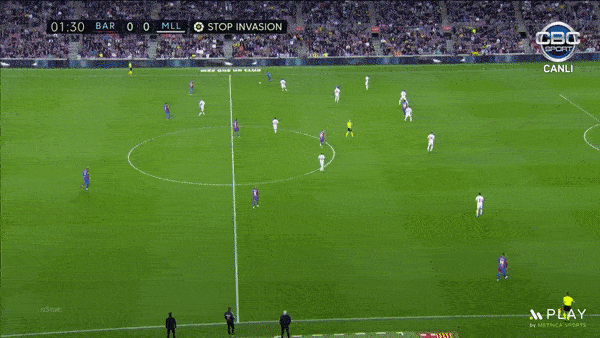
What they have to consider in these situations is whether there is real value in even making the pass. What happens if Alba’s ball connects with one of the two possible targets higher up the pitch? Yes, Barcelona gain territory but is the player receiving the ball even in a good enough situation to advance the play further? Does it destabilise the opposition’s block? Does it create a good platform to pose a threat? Can the player even receive cleanly?
A case could be made for a potential one-two with Gavi who’s making a run from the deep but that, again, is a very difficult sequence to execute. The other option is going backwards. Now, consider the alternative - Barcelona lose the ball moments later and Mallorca suddenly charge forward from a relatively high position with at least five players in prime position to penetrate the block. Risk vs reward again with the risk being far too high and the reward far too low.
Final remarks
In the Europe-clinching victory against Real Betis, Xavi kept screaming ‘calma, calma’ from the sidelines, instructing the team to slow down and think before rushing forward. That, in my opinion, is what epitomises Barcelona under their new and promising coach; their foot is on the gas at all times.
But there has to be a pausa in their approach too; the ability to know when to speed up and when to slow down according to the game state, the team’s needs and the opposition’s preference. Of course, for such a young and eager squad, this may not be obvious at first. However, if Barcelona are to get back to the peak of the mountain, they’ll have to master (self) control.
That’s the key next step on the Catalans’ journey into the world of the elite.


